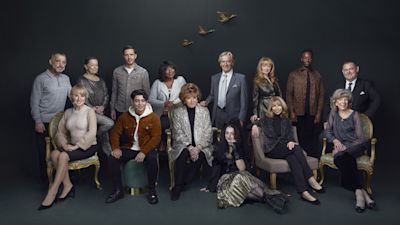The enduring appeal of Coronation Street as it marks its 60th anniversary

When my parents arrived here in the UK from rural Punjab in India, they were keen to absorb the local culture. It was 1960 and some of their fellow immigrant families had bought a TV. So Mum joined her newly arrived Indian friends in December 1960 to watch this groundbreaking programme on ITV and learn about their new country.And the thing that struck her and the other Indian women most, she would later tell us, is the fact that the English ladies could sit in the pub all day and drink!
Helen Worth - aka Gail Platt - on the enduring appeal of The Street
It is perhaps a part of the culture that was better absorbed by that generation’s offspring - my sister and I were particularly good at this! - but she passed on to us a love of the programme that has become key to Coronation Street’s enduring appeal.
Parents and grandparents sitting down to watch over the years with their children who would then repeat this practice with theirs, and so on. We had to wait many years to see residents on the Street that looked like us. But they were Northern and working class and so were we, so we took that.
What Corrie creator Tony Warren conceived as an everyday community in a northern town, living ordinary lives, was of course often anything but that. Over the decades, there have been 57 births, 146 deaths- including the odd murder - and 131 weddings - this is not your average street. But its mission was to offer an alternative to a TV schedule populated by people speaking the Queen’s English. Northern accents heard on characters like Ena Sharples and Elsie Tanner set off a TV revolution; the kitchen sinks dramas and gritty realism then all the rage on film and the stage, had a TV equivalent on these 11,000 cobbles.
To keep the viewers, of course, writers have had to come up with ever more dramatic storylines - remember the days when Mavis’ budgie Harry was the big plot line?Now we have the endings of a disturbing coercive control story, a heartbreaking drama about a child’s death from a rare disease, and, to mark the 60th anniversary, the denouement of a plot about the very existence of the Street itself as residents join to fight off a developer’s plan to bulldoze the houses for good.
The story may be about the survival of the street, but of course over the past six decades Corrie has proved its resilience and strength. Born in an era when there were just two TV channels (ITV and BBC) and now in a TV landscape where viewers have the choice of hundreds, it more than holds its own - seeing off its soap rivals with viewers of up to 8 million.
Sold to 130 countries, the series has a huge international following too. It is the team of writers who are tasked with keeping it that way, making sure that new generations become viewers and that young acting talent populate the cobbles to allow a diversity of storylines and characters. With six programmes a week, the demands on the cast can be enormous, and they will tell you that any sniffiness about soap or continuing drama as it is now more respectfully called, is misplaced.
You have to be on the ball to make that many shows with that many involved stories - it is, as William Roache, who’s played Ken Barlow for 60 years, will tell you, a series where you can get scenes every bit as dramatic and beautifully written as something you might see on a West End stage or a big screen.Even a pandemic hasn’t derailed Corrie; the Barlows, Platts,the McDonalds, the Baileys, the Metcalfes - in fact all of them have simply carried on after a brief break in filming due to lockdown. I am of course, hooked like many millions. All the talk now is of the next 60 years. You wouldn’t bet against it.